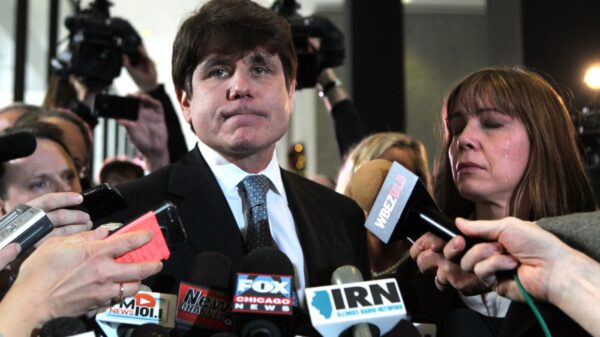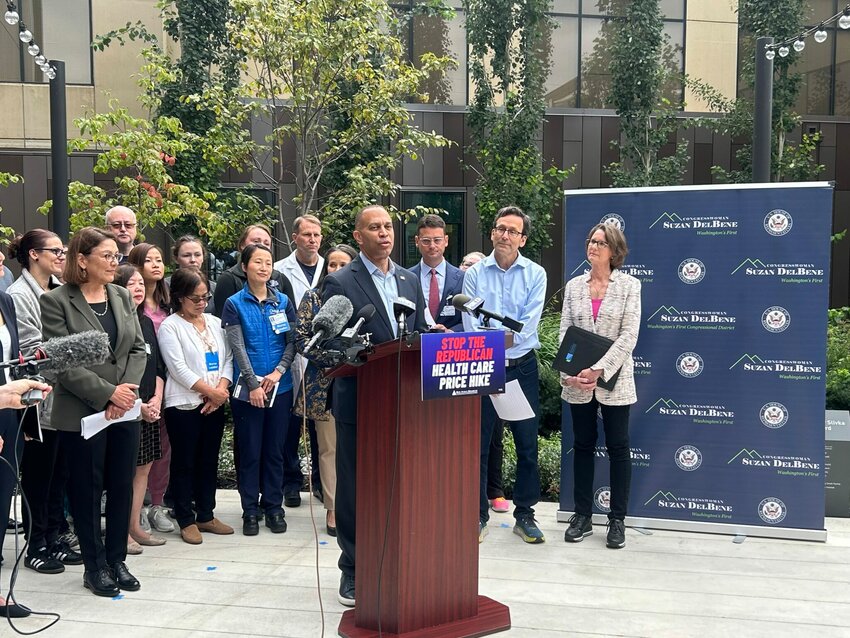Health insurance premiums in Washington state are set to increase significantly next year, prompting strong reactions from political leaders. According to state Insurance Commissioner Patty Kuderer, premiums for individual insurance purchased through the Washington Health Benefit Exchange will rise by an average of 21% in 2024. This increase follows a previous average rise of 10.7% last year and aligns with similar trends observed nationwide.
During a press conference held at Overlake Medical Center in Bellevue on September 29, Hakeem Jeffries, the top Democrat in the U.S. House, attributed these rising costs to recent actions by congressional Republicans and the administration of former President Donald Trump. Jeffries expressed concern for low-income Americans facing cuts to Medicaid and the impending expiration of federal tax credits that help many afford their insurance coverage. He warned that without a reversal of these policies, health care accessibility could further deteriorate.
The Washington Health Benefit Exchange serves nearly 300,000 residents who do not receive employer-sponsored insurance or qualify for public programs like Medicaid, known in Washington as Apple Health. Approximately three-quarters of these individuals benefit from federal premium tax credits, which have reduced their annual premiums by an average of $1,330. For seniors, these savings can exceed $1,900 annually. However, these crucial subsidies, which were introduced during the COVID-19 pandemic, are set to expire at the end of 2023 unless Congress intervenes.
Kuderer emphasized the urgency of Congressional action, as the state must approve any rate increases deemed necessary before the open enrollment period, which begins on November 1 and lasts until January 15. The Washington Health Benefit Exchange Board plans to request tens of millions of dollars from the state Legislature to help offset the loss of these tax credits.
The political implications of these rising costs were underscored by Jeffries’ comments regarding the upcoming government funding deadline on September 30, 2023. He stated that Democrats would only support a bipartisan spending agreement that prioritizes the health, safety, and economic well-being of the American people. He firmly rejected any partisan funding plans that could undermine health care services.
Senate Democratic Leader Chuck Schumer reinforced this message, aligning with Jeffries in opposition to any funding strategies that neglect their health care demands. Both leaders highlighted the critical nature of maintaining affordable health care access for all Americans.
The expiration of tax credits is projected to leave around 80,000 people in Washington without coverage. Those likely to forgo insurance are often healthier, which could result in higher premiums for those who remain insured, as the insurance pool becomes less balanced. Nationwide, health insurance costs are expected to rise by over 75%, potentially leading to more than 4 million individuals becoming uninsured, according to the nonpartisan health research group KFF.
In the face of these challenges, state officials are also preparing for significant cuts to Medicaid, stemming from recent legislation aimed at eliminating waste and fraud. Critics warn that these new work requirements could cost the state billions in federal funding and result in hundreds of thousands losing their coverage. While the impact of these changes will not be fully understood until the new requirements take effect in January 2027, the immediate concerns about health care accessibility remain paramount.
As Washington grapples with these critical issues, leaders like Suzan DelBene reminded constituents of the progress made in expanding health care access over the years, expressing a commitment to continue fighting for affordable care. DelBene stated, “We should be talking about what we do to go forward, not going backward,” emphasizing the importance of maintaining momentum in health care reform.
The urgency of these discussions highlights the intersection of health care policy and political strategy in the United States, as leaders work to navigate complex issues affecting millions of Americans.





































































